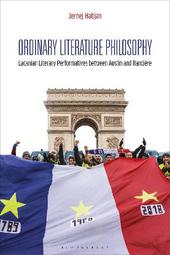
|
Ordinary Literature Philosophy: Lacanian Literary Performatives between Austin and Ranciere
Hardback
Main Details
| Title |
Ordinary Literature Philosophy: Lacanian Literary Performatives between Austin and Ranciere
|
| Authors and Contributors |
By (author) Jernej Habjan
|
| Physical Properties |
| Format:Hardback | | Pages:192 | | Dimensions(mm): Height 234,Width 156 |
|
| Category/Genre | Philosophy of language
Deconstructionism, structuralism and post-structuralism |
|---|
| ISBN/Barcode |
9781350086074
|
| Classifications | Dewey:401 |
|---|
| Audience | | Tertiary Education (US: College) | |
|---|
|
Publishing Details |
| Publisher |
Bloomsbury Publishing PLC
|
| Imprint |
Bloomsbury Academic
|
| Publication Date |
26 December 2019 |
| Publication Country |
United Kingdom
|
Description
The first extended Lacanian reading of J. L. Austin's ordinary language philosophy, this book examines how it has been received in the continental tradition by Jacques Derrida and Judith Butler, Jacques Ranciere and Oswald Ducrot. This is a tradition that neglects Austin's general speech act theory on behalf of his special theory of the performative, whilst bringing a new attention to the literary and the aesthetic. The book charts each of these theoretical interactions with a Lacanian reading of the thinker through a case study. Austin, Derrida and Butler are respectively read with a Hollywood blockbuster, a Shakespearean bestseller and a globally influential May '68 poster - texts preoccupied with the problem of subjectivity in early, high and postmodernity. Hence Austin's constatives (nonperformative statements) are explored with Dead Poets Society; Derridean naming with Romeo and Juliet; and Butlerian aesthetic re-enactment with We Are all German Jews. Finally, Ranciere and Ducrot enable a return to Austin beyond his continental reception. Austin is valorised with a theory as attractive, and as irreducible, to the continental tradition as his own thought, namely Jacques Lacan's theory of the signifier. Drawing together some of the giants of language theory, psychoanalysis and poststructuralist thought, Habjan offers a new materialist reading of the 'ordinary' status of literary language and a vital contribution to current debates within literary studies and contemporary philosophy.
Author Biography
Jernej Habjan is Research Fellow at the Research Centre and Assistant Professor at the Postgraduate School, of the Slovenian Academy of Sciences and Arts (ZRC SAZU), Ljubljana, Slovenia. He is the co-editor Globalizing Literary Genres (2016) and (Mis)readings of Marx in Continental Philosophy (2014).
ReviewsOrdinary Literature Philosophy is no ordinary book. In Habjan's powerful and challenging argument, speech-act theory, from Austin to Butler, is recast as a powerful weapon for thinking subjectivity and institutional politics. This extraordinary book moves from Dead Poets Society to Romeo and Juliet and beyond to reveal the ideological limits we face and suggests how we might overcome them. * Benjamin Noys, Professor of Critical Theory, University of Chichester, UK * Habjan traverses an untrodden path in Lacanian literary studies. By exposing the relevance of Austin's speech act to Lacan's (un-signified)-signifier and critical reception of the idea by Derrida and Butler, Habjan authenticates a return to Austin's philosophy of doing things with words. He views Ducrot's enunciative theory as an analogue of Lacan's theory of discourses. * Ehsan Azari Stanizai, Lecturer in Literary Studies, National Institute of Dramatic Art, Australia * Jernej Habjan's Lacanian interpretation of speech act theory is an important intervention into the continental reception of the work of Austin and Searle, and of ordinary language philosophy more generally. Habjan's analysis of "etiolated" (i.e., non-pragmatic) speech acts, such as literary writing, is an erudite and incisive reframing of post-structuralist approaches to literature. He successfully brings the social context back into the discussion in a critical way while highlighting the effect of subjectivation that happens with speech acts. His discussion of Derrida and Butler then takes shape as an appropriative critique that develops and extends the deconstructive analysis of Austin and Searle, but at the same time argues against their neglect of subjectivity. It is also accessibly written and clearly structured. * Geoff Boucher, Associate Professor in Literary Studies, Deakin University, Australia *
|